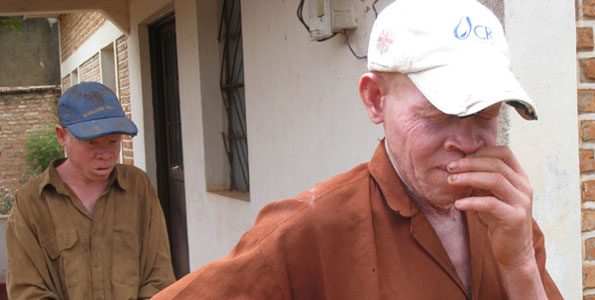
United Nations rights advocates last week challenged Tanzanian officials regarding the recent killings of 36 albinos, the prevalence of female genital cutting, and corporal punishment in the country’s schools.
Several members of the UN Committee on the Rights of the Child posed pointed questions to a Tanzanian delegation headed by Pindi Hazara Chana, Deputy Minister of Community Development, Gender and Children. The UN panel was conducting a periodic review of Tanzania’s implementation of an international pact on children’s rights.
The advocates “expressed deep concerns about violence and discrimination perpetrated against persons and children with albinism,” according to an official account of the meeting that took place at the UN offices in Geneva.
Five individuals have been charged in connection with the killings, Mr Chana said. He added that “the government attached great importance to the issue of stopping traditional healers from harming others,” and is seeking to place a ban on fortune tellers, “who often encouraged the use of organs of persons with albinism.”
Genital cutting is being carried out on “younger and younger girls,” the advocates noted. The practice has been made illegal in Tanzania, Mr Chana said. Girls are increasingly reporting cases of the cut and are being taken to hostels for their protection, he added. Rural areas, where the tradition is deeply rooted, have been explicitly targeted by the government, Mr Chana told the panel.
The UN committee took note of a decline in the prevalence of female genital cutting — from 18 per cent of Tanzanian women surveyed in 1996, to 15 per cent as reported in 2010.
Corporal punishment is still permitted in homes and in schools, the UN monitors observed, saying it should be prohibited altogether.
Mr Chana pointed out that corporal punishment had been banned in Zanzibar, adding that in the rest of the country, only head teachers were authorised to administer such punishment. He agreed that the practice should be abolished, but cautioned that achieving this will require “a change in mind sets.”
Mr Chana said that improvements in laws have resulted in greater protection of children, and said the government is committed to making further progress.
FRENCH VERSION
Plusieurs membres de la Commission des Nations Unies relativeaux droits de l’enfant a posé des questions pointues d’unedélégation tanzanienne conduite par Pindi Hazara Chana, sous-ministre du développement communautaire, entre les sexes etdes enfants. Le groupe d’experts a entrepris un examenpériodique de l’application de la Tanzanie d’un Pacteinternational sur les droits de l’enfant.
Les avocats « préoccupés profonde par violence et discriminationperpétrés contre les personnes et les enfants atteints d’albinisme, » selon un compte rendu officiel de la réunion qui s’est dérouléedans les bureaux de l’ONU à Genève.
Cinq personnes ont été inculpées pour le meurtre, a déclaré M.Chana. Il a ajouté que « le gouvernement attache une grandeimportance à la question de l’arrêt des guérisseurs traditionnelsde nuire à d’autres, » et est qui tente d’imposer une interdictiondes diseuses de bonne aventure, « qui a souvent encouragél’utilisation d’organes de personnes avec albinisme. »
LIRE : Tanzanie maintenant interdit les griots pour enrayer lesassassinats d’albinos
Mutilation génitale est réalisée sur les « filles de plus en plus jeunes, » a noté les défenseurs. La pratique a été déclarée illégaleen Tanzanie, a déclaré M. Chana. Les filles sont plus dénoncer lescas de la coupe et sont prises aux pensions pour assurer leurprotection, a-t-il ajouté. Les zones rurales, où la tradition estprofondément enracinée, ont été explicitement visés par legouvernement, M. Chana a déclaré au groupe.
Le Comité de l’ONU a pris note d’une baisse de la prévalence del’excision — de 18 pour cent des femmes tanzaniennes ont fouillé en 1996, à 15 % comme indiqué en 2010.
Le châtiment corporel est toujours permis dans les foyers et dansles écoles, les observateurs des Nations Unies a observé, disant :il devrait être interdit au total.
M. Chana a fait observer que le châtiment corporel avait étéinterdit à Zanzibar, ajoutant que, dans le reste du pays, seulschefs d’établissement ont été autorisés à administrer de telschâtiments. Il est convenu que la pratique devrait être abolie,mais a averti que l’atteinte de cet objectif nécessitera « unchangement dans les jeux de l’esprit ».
M. Chana dit qu’amélioration des lois ont abouti à une meilleureprotection des enfants et dit que le gouvernement s’est engagé àfaire de nouveaux progrès.


